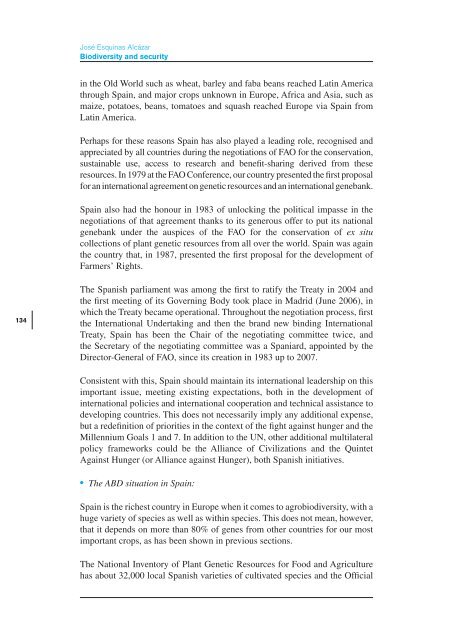Food security and global security - IEEE
Food security and global security - IEEE
Food security and global security - IEEE
- No tags were found...
You also want an ePaper? Increase the reach of your titles
YUMPU automatically turns print PDFs into web optimized ePapers that Google loves.
José Esquinas AlcázarBiodiversity <strong>and</strong> <strong>security</strong>in the Old World such as wheat, barley <strong>and</strong> faba beans reached Latin Americathrough Spain, <strong>and</strong> major crops unknown in Europe, Africa <strong>and</strong> Asia, such asmaize, potatoes, beans, tomatoes <strong>and</strong> squash reached Europe via Spain fromLatin America.Perhaps for these reasons Spain has also played a leading role, recognised <strong>and</strong>appreciated by all countries during the negotiations of FAO for the conservation,sustainable use, access to research <strong>and</strong> benefit-sharing derived from theseresources. In 1979 at the FAO Conference, our country presented the first proposalfor an international agreement on genetic resources <strong>and</strong> an international genebank.Spain also had the honour in 1983 of unlocking the political impasse in thenegotiations of that agreement thanks to its generous offer to put its nationalgenebank under the auspices of the FAO for the conservation of ex situcollections of plant genetic resources from all over the world. Spain was againthe country that, in 1987, presented the first proposal for the development ofFarmers’ Rights.134The Spanish parliament was among the first to ratify the Treaty in 2004 <strong>and</strong>the first meeting of its Governing Body took place in Madrid (June 2006), inwhich the Treaty became operational. Throughout the negotiation process, firstthe International Undertaking <strong>and</strong> then the br<strong>and</strong> new binding InternationalTreaty, Spain has been the Chair of the negotiating committee twice, <strong>and</strong>the Secretary of the negotiating committee was a Spaniard, appointed by theDirector-General of FAO, since its creation in 1983 up to 2007.Consistent with this, Spain should maintain its international leadership on thisimportant issue, meeting existing expectations, both in the development ofinternational policies <strong>and</strong> international cooperation <strong>and</strong> technical assistance todeveloping countries. This does not necessarily imply any additional expense,but a redefinition of priorities in the context of the fight against hunger <strong>and</strong> theMillennium Goals 1 <strong>and</strong> 7. In addition to the UN, other additional multilateralpolicy frameworks could be the Alliance of Civilizations <strong>and</strong> the QuintetAgainst Hunger (or Alliance against Hunger), both Spanish initiatives.• The ABD situation in Spain:Spain is the richest country in Europe when it comes to agrobiodiversity, with ahuge variety of species as well as within species. This does not mean, however,that it depends on more than 80% of genes from other countries for our mostimportant crops, as has been shown in previous sections.The National Inventory of Plant Genetic Resources for <strong>Food</strong> <strong>and</strong> Agriculturehas about 32,000 local Spanish varieties of cultivated species <strong>and</strong> the Official
















